Infection
2-year-old boy dies after being infected with rare brain-eating amoeba, officials say
LINCOLN COUNTY, Nev. (KVVU/Gray News) – Health officials say a young boy has died in rural Nevada after getting a rare infection.
According to the Nevada Division of Public and Behavioral Health, a 2-year-old child in Lincoln County named Woodrow Bundy died from a Naegleria fowleri infection, also known as a brain-eating amoeba.
“It came on real fast. Flu-like symptoms, fever – just like any other little sickness that a little boy might get.” Woodrow’s aunt Bailey Logue told KVVU.
According to the DPBH, Woodrow may have been infected at Ash Springs, a natural hot spring located on federal land in Lincoln County.
The Centers for Disease Control and Prevention notified health officials that Naegleria fowleri was the cause of the boy’s illness.
Naegleria fowleri is a microscopic single-celled living amoeba that occurs naturally in the environment.
This amoeba can cause a very serious rare infection that destroys brain tissue and is almost always fatal, according to the DPBH.
“If you wind up getting infected with it, chances are you’re going to die,” Dr. Brian Labus said. “Very few people have actually survived this type of infection.”
Heath officials said that Naegleria fowleri lives in soil and warm freshwaters, such as lakes, rivers and hot springs. The amoeba infects people by entering the body through the nose and traveling to the brain.
“That’s where it starts to multiply and starts to destroy brain tissue,” Labus said. “It progresses rather rapidly because it’s actively destroying brain tissue. So, it’s very difficult for your body to deal with something like that and fight it off.”
Naegleria fowleri is not spread from person to person. Symptoms reportedly start with a severe headache, fever, and nausea before progressing to seizures and possible death.
Because Naegleria fowleri occurs naturally in the environment, it cannot be eliminated from fresh bodies of water. Although the risk is low, recreational water users should always assume there is a risk when they enter warm freshwaters.
Doctors are reminding parents of the dangers of their children swimming in freshwater, but this type of infection still remains very rare.
“We’re not supposed to live in fear,” Logue said. “You can still take your kids to the lake and the ponds and all the things.”
The CDC recommends taking precautions that include not jumping into bodies of warm freshwater, especially during the summer, and avoiding putting your head underwater in hot springs and other untreated geothermal waters.
Copyright 2023 KVVU via Gray Media Group, Inc. All rights reserved.

